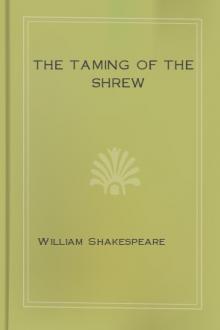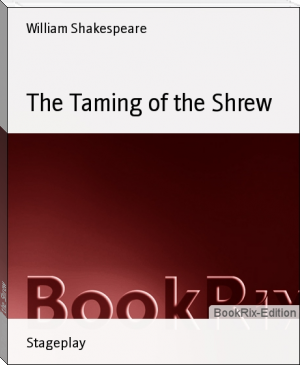The Taming of the Shrew by William Shakespeare (best novel books to read txt) 📕

- Author: William Shakespeare
- Performer: -
Book online «The Taming of the Shrew by William Shakespeare (best novel books to read txt) 📕». Author William Shakespeare
TRANIO.
Shall sweet Bianca practise how to bride it?
BAPTISTA.
She shall, Lucentio. Come, gentlemen, let’s go.
[Exeunt.]
ACT IV.
SCENE I. A hall in PETRUCHIO’S country house.
[Enter GRUMIO.]
GRUMIO.
Fie, fie on all tired jades, on all mad masters, and all
foul ways! Was ever man so beaten? Was ever man so ray’d? Was
ever man so weary? I am sent before to make a fire, and they are
coming after to warm them. Now, were not I a little pot and soon
hot, my very lips might freeze to my teeth, my tongue to the roof
of my mouth, my heart in my belly, ere I should come by a fire to
thaw me. But I with blowing the fire shall warm myself; for,
considering the weather, a taller man than I will take cold.
Holla, ho! Curtis!
[Enter CURTIS.]
CURTIS.
Who is that calls so coldly?
GRUMIO.
A piece of ice: if thou doubt it, thou mayst slide from my
shoulder to my heel with no greater a run but my head and my
neck. A fire, good Curtis.
CURTIS.
Is my master and his wife coming, Grumio?
GRUMIO.
O, ay! Curtis, ay; and therefore fire, fire; cast on no
water.
CURTIS.
Is she so hot a shrew as she’s reported?
GRUMIO.
She was, good Curtis, before this frost; but thou knowest
winter tames man, woman, and beast; for it hath tamed my old
master, and my new mistress, and myself, fellow Curtis.
CURTIS.
Away, you three-inch fool! I am no beast.
GRUMIO.
Am I but three inches? Why, thy horn is a foot; and so long
am I at the least. But wilt thou make a fire, or shall I complain
on thee to our mistress, whose hand,—she being now at hand,—
thou shalt soon feel, to thy cold comfort, for being slow in thy
hot office?
CURTIS.
I prithee, good Grumio, tell me, how goes the world?
GRUMIO.
A cold world, Curtis, in every office but thine; and
therefore fire. Do thy duty, and have thy duty, for my master and
mistress are almost frozen to death.
CURTIS.
There’s fire ready; and therefore, good Grumio, the news?
GRUMIO.
Why, ‘Jack boy! ho, boy!’ and as much news as thou wilt.
CURTIS.
Come, you are so full of cony-catching.
GRUMIO.
Why, therefore, fire; for I have caught extreme cold.
Where’s the cook? Is supper ready, the house trimmed, rushes
strewed, cobwebs swept, the serving-men in their new fustian,
their white stockings, and every officer his wedding-garment on?
Be the Jacks fair within, the Jills fair without, and carpets
laid, and everything in order?
CURTIS.
All ready; and therefore, I pray thee, news?
GRUMIO.
First, know my horse is tired; my master and mistress fallen out.
CURTIS.
How?
GRUMIO.
Out of their saddles into the dirt; and thereby hangs a tale.
CURTIS.
Let’s ha’t, good Grumio.
GRUMIO.
Lend thine ear.
CURTIS.
Here.
GRUMIO.
[Striking him.] There.
CURTIS.
This ‘tis to feel a tale, not to hear a tale.
GRUMIO.
And therefore ‘tis called a sensible tale; and this cuff
was but to knock at your car and beseech listening. Now I begin:
Imprimis, we came down a foul hill, my master riding behind my
mistress,—
CURTIS.
Both of one horse?
GRUMIO.
What’s that to thee?
CURTIS.
Why, a horse.
GRUMIO.
Tell thou the tale: but hadst thou not crossed me, thou
shouldst have heard how her horse fell and she under her horse;
thou shouldst have heard in how miry a place, how she was
bemoiled; how he left her with the horse upon her; how he beat me
because her horse stumbled; how she waded through the dirt to
pluck him off me: how he swore; how she prayed, that never prayed
before; how I cried; how the horses ran away; how her bridle was
burst; how I lost my crupper; with many things of worthy memory,
which now shall die in oblivion, and thou return unexperienced to
thy grave.
CURTIS.
By this reckoning he is more shrew than she.
GRUMIO.
Ay; and that thou and the proudest of you all shall find
when he comes home. But what talk I of this? Call forth
Nathaniel, Joseph, Nicholas, Philip, Walter, Sugarsop, and the
rest; let their heads be sleekly combed, their blue coats brush’d
and their garters of an indifferent knit; let them curtsy with
their left legs, and not presume to touch a hair of my master’s
horse-tail till they kiss their hands. Are they all ready?
CURTIS.
They are.
GRUMIO.
Call them forth.
CURTIS.
Do you hear? ho! You must meet my master to countenance my
mistress.
GRUMIO.
Why, she hath a face of her own.
CURTIS.
Who knows not that?
GRUMIO.
Thou, it seems, that calls for company to countenance her.
CURTIS.
I call them forth to credit her.
GRUMIO.
Why, she comes to borrow nothing of them.
[Enter several SERVANTS.]
NATHANIEL.
Welcome home, Grumio!
PHILIP.
How now, Grumio!
JOSEPH.
What, Grumio!
NICHOLAS.
Fellow Grumio!
NATHANIEL.
How now, old lad!
GRUMIO.
Welcome, you; how now, you; what, you; fellow, you;
and thus much for greeting. Now, my spruce companions, is all
ready, and all things neat?
NATHANIEL.
All things is ready. How near is our master?
GRUMIO.
E’en at hand, alighted by this; and therefore be not,—
Cock’s passion, silence! I hear my master.
[Enter PETRUCHIO and KATHERINA.]
PETRUCHIO.
Where be these knaves? What! no man at door
To hold my stirrup nor to take my horse?
Where is Nathaniel, Gregory, Philip?—
ALL SERVANTS.
Here, here, sir; here, sir.
PETRUCHIO.
Here, sir! here, sir! here, sir! here, sir!
You logger-headed and unpolish’d grooms!
What, no attendance? no regard? no duty?
Where is the foolish knave I sent before?
GRUMIO.
Here, sir; as foolish as I was before.
PETRUCHIO.
You peasant swain! you whoreson malt-horse drudge!
Did I not bid thee meet me in the park,
And bring along these rascal knaves with thee?
GRUMIO.
Nathaniel’s coat, sir, was not fully made,
And Gabriel’s pumps were all unpink’d i’ the heel;
There was no link to colour Peter’s hat,
And Walter’s dagger was not come from sheathing;
There was none fine but Adam, Ralph, and Gregory;
The rest were ragged, old, and beggarly;
Yet, as they are, here are they come to meet you.
PETRUCHIO.
Go, rascals, go and fetch my supper in.
[Exeunt some of the SERVANTS.]
Where is the life that late I led?
Where are those—? Sit down, Kate, and welcome.
Soud, soud, soud, soud!
[Re-enter SERVANTS with supper.]
Why, when, I say?—Nay, good sweet Kate, be merry.—
Off with my boots, you rogues! you villains! when?
It was the friar of orders grey,
As he forth walked on his way:
Out, you rogue! you pluck my foot awry:
[Strikes him.]
Take that, and mend the plucking off the other.
Be merry, Kate. Some water, here; what, ho!
Where’s my spaniel Troilus? Sirrah, get you hence
And bid my cousin Ferdinand come hither:
[Exit SERVANT.]
One, Kate, that you must kiss and be acquainted with.
Where are my slippers? Shall I have some water?
Come, Kate, and wash, and welcome heartily.—
[SERVANT lets the ewer fall. PETRUCHIO strikes him.]
You whoreson villain! will you let it fall?
KATHERINA.
Patience, I pray you; ‘twas a fault unwilling.
PETRUCHIO.
A whoreson, beetle-headed, flap-ear’d knave!
Come, Kate, sit down; I know you have a stomach.
Will you give thanks, sweet Kate, or else shall I?—
What’s this? Mutton?
FIRST SERVANT.
Ay.
PETRUCHIO.
Who brought it?
PETER.
I.
PETRUCHIO.
‘Tis burnt; and so is all the meat.
What dogs are these! Where is the rascal cook?
How durst you, villains, bring it from the dresser,
And serve it thus to me that love it not?
[Throws the meat, etc., at them.]
There, take it to you, trenchers, cups, and all.
You heedless joltheads and unmanner’d slaves!
What! do you grumble? I’ll be with you straight.
KATHERINA.
I pray you, husband, be not so disquiet;
The meat was well, if you were so contented.
PETRUCHIO.
I tell thee, Kate, ‘twas burnt and dried away,
And I expressly am forbid to touch it;
For it engenders choler, planteth anger;
And better ‘twere that both of us did fast,
Since, of ourselves, ourselves are choleric,
Than feed it with such over-roasted flesh.
Be patient; to-morrow ‘t shall be mended.
And for this night we’ll fast for company:
Come, I will bring thee to thy bridal chamber.
[Exeunt PETRUCHIO, KATHERINA, and CURTIS.]
NATHANIEL.
Peter, didst ever see the like?
PETER.
He kills her in her own humour.
[Re-enter CURTIS.]
GRUMIO.
Where is he?
CURTIS.
In her chamber, making a sermon of continency to her;
And rails, and swears, and rates, that she, poor soul,
Knows not which way to stand, to look, to speak,
And sits as one new risen from a dream.
Away, away! for he is coming hither.
[Exeunt.]
[Re-enter PETRUCHIO.]
PETRUCHIO.
Thus have I politicly begun my reign,
And ‘tis my hope to end successfully.
My falcon now is sharp and passing empty.
And till she stoop she must not be full-gorg’d,
For then she never looks upon her lure.
Another way I have to man my haggard,
To make her come, and know her keeper’s call,
That is, to watch her, as we watch these kites
That bate and beat, and will not be obedient.
She eat no meat to-day, nor none shall eat;
Last night she slept not, nor to-night she shall not;
As with the meat, some undeserved fault
I’ll find about the making of the bed;
And here I’ll fling the pillow, there the bolster,
This way the coverlet, another way the sheets;
Ay, and amid this hurly I intend
That all is done in reverend care of her;
And, in conclusion, she shall watch all night:
And if she chance to nod I’ll rail and brawl,
And with the clamour keep her still awake.
This is a way to kill a wife with kindness;
And thus I’ll curb her mad and headstrong humour.
He that knows better how to tame a shrew,
Now let him speak; ‘tis charity to show.
[Exit.]
SCENE II. Padua. Before BAPTISTA’S house.
[Enter TRANIO and HORTENSIO.]
TRANIO.
Is ‘t possible, friend Licio, that Mistress Bianca
Doth fancy any other but Lucentio?
I tell you, sir, she bears me fair in hand.
HORTENSIO.
Sir, to satisfy you in what I have said,
Stand by and mark the manner of his teaching.
[They stand aside.]
[Enter BIANCA and LUCENTIO.]
LUCENTIO.
Now, mistress, profit you in what you read?
BIANCA.
What, master, read you, First resolve me that.
LUCENTIO.
I read that I profess, the Art to Love.
BIANCA.
And may you prove, sir, master of your art!
LUCENTIO.
While you, sweet dear, prove mistress of my heart.
[They retire.]
HORTENSIO.
Quick proceeders, marry! Now tell me, I pray,
You that durst swear that your Mistress Bianca
Lov’d none in the world so well as Lucentio.
TRANIO.
O despiteful love! unconstant womankind!
I tell thee, Licio, this is wonderful.
HORTENSIO.
Mistake no more; I am not Licio.
Nor a musician as I seem to be;
But one that scorn to live in this disguise
For such a one as leaves a gentleman
And makes a god of such a cullion:
Know, sir, that I am call’d Hortensio.
TRANIO.





Comments (0)